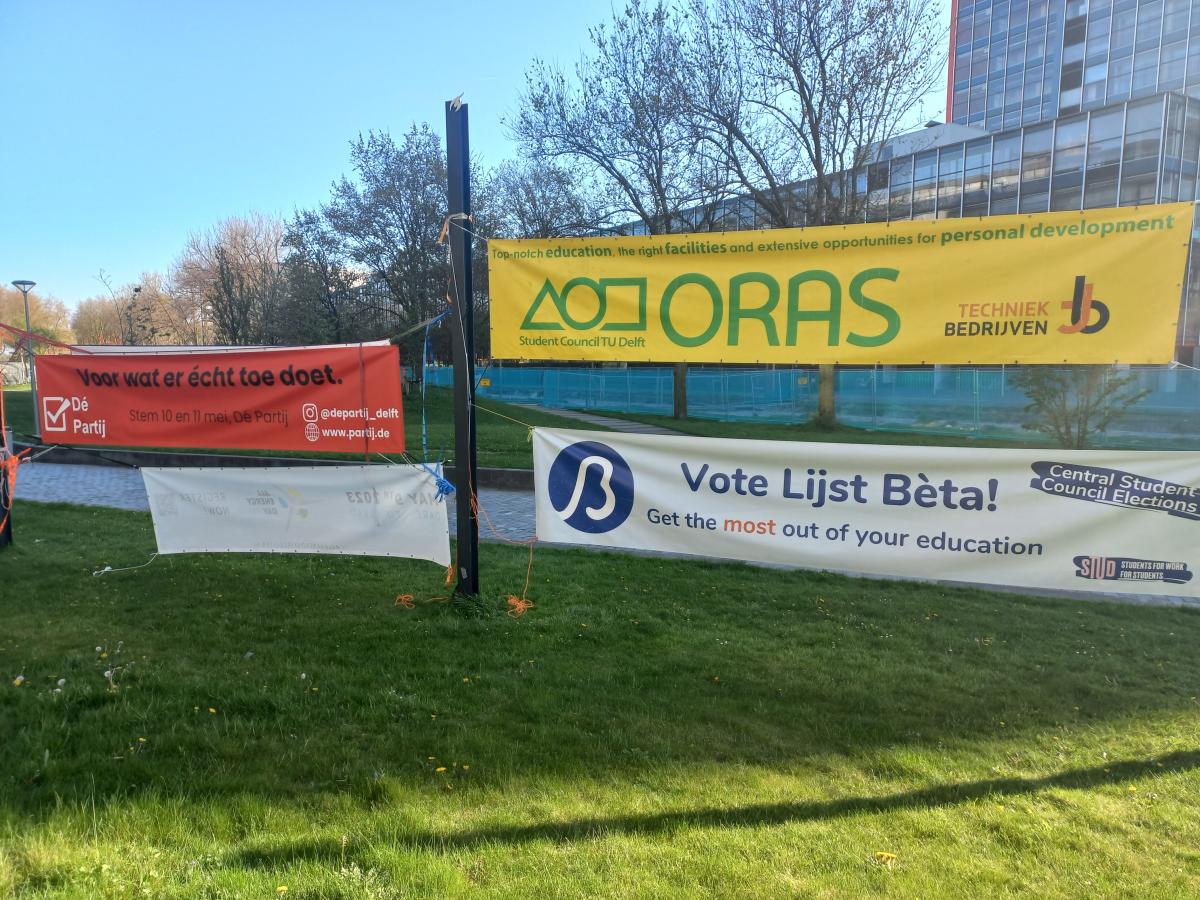Joy and disappointment after the Student Council elections. Newcomer Dé Partij gains one seat. Lijst Bèta remains at four, while ORAS loses another seat.
(Photo: Saskia Bonger)
This means that Oras has gone from seven to five seats in two years time. ORAS Chair Marten Leenders calls this ‘a big slap in the face’. He says “This is disappointing even if, looking back, the outcome could be expected. We expected that as a newcomer De Partij would win one seat and that seat must be taken from someone. As both ORAS and De Partij focus on the idea that student life consists of more than only diving into books, we are all fishing from the same pond.”
This year ORAS is concentrating on its physical visibility, an example of which is the green and yellow ORAS lounge close to the Faculty of Industrial Design Engineering. “We spoke to students there about our vision and position on issues.” Looking back, would Marten and his colleagues have run the campaign differently? No, he says. “I am very proud of the campaign that we ran and I believe that we were highly visible. We still need to evaluate our campaign and hopefully we will see some points which will help us regain that seat next year.”
De Partij’s party candidate, Koos Meesters, is in his element about the outcome. It was the first time his party took part in the elections. “We went for more seats, but even one is really great. We now have a foot in the door.” Over the last few weeks, Koos and his colleagues have done their best to run a lighthearted campaign. “We had little choice as we only had a brief period in which to draw attention to ourselves,” he says. His party also visited large student houses to hold talks in the communal areas.
Visibility
One of his first tasks is to make the Student Council’s activities more visible. One of the ways this can be done is to put the minutes of the meetings online. “This is not done at the moment because it is assumed that no students would be interested in reading them. But even if only three people read the minutes, that would be something.” He also wants to regularly update students at TU Delft on what he and the rest of the Student Council have done. “One idea is to do this in a video in which we explain a meeting with the Executive Board. Or that we have had a meeting with a committee which did not lead anywhere. This is important to communicate too.”
Abdelkader Karbache too is happy with the outcome of the elections. His party, Lijst Bèta, won four seats, like last year. “This shows that students see themselves in our story.” Abdelkader and his colleagues primarily drew attention to Lijst Bèta’s vision instead of making election promises about future projects. “We think that the quality of education is highly important and believe that once your study is designed well that you have time left for extracurricular activities.”
‘TU Delft students are a fairly homogenous group ’
A round of questioning by Delta among students showed that some students do not see the difference between ORAS and Lijst Bèta. Both Marten and Abdelkader understand why this is the case. “We hear this a lot from students, and understand it,” says Marten. “TU Delft students are a fairly homogenous group so within the student population there are fewer differences than, say, between people who have the right to vote in national elections. This means that there is less opportunity to make your party distinct.” Still, he believes that there is still enough to choose from. “We see the BSA differently than Lijst Béta does as our vision is based on different things. We think it is important that students have the chance to do things on top of their studies, while Lijst Bèta concentrates on the quality of education. As a Student Council member, if you talk to students you can explain the difference easily.”
Abdelkader says that “we are both part of the Student Council which, as a whole, works for TU Delft students, so I get that the difference is hard to substantiate.” He too believes that there is quite a difference. “To give just one example, we completely support the views of End Fossil [the action group demanding that TU Delft sever all ties with the fossil industry, ed.] while ORAS only supports some of them. And we put more effort into social safety while ORAS concentrates more on sports.”
The turnout for the elections was 30%, making it higher than in 2022 (29.8%) and in 2021 (27.6%), but quite a bit lower than the preceding years (35.4% in 2019, 38.1% in 2018 and 44.2% in 2017).
Do you have a question or comment about this article?
a.m.debruijn@tudelft.nl


Comments are closed.